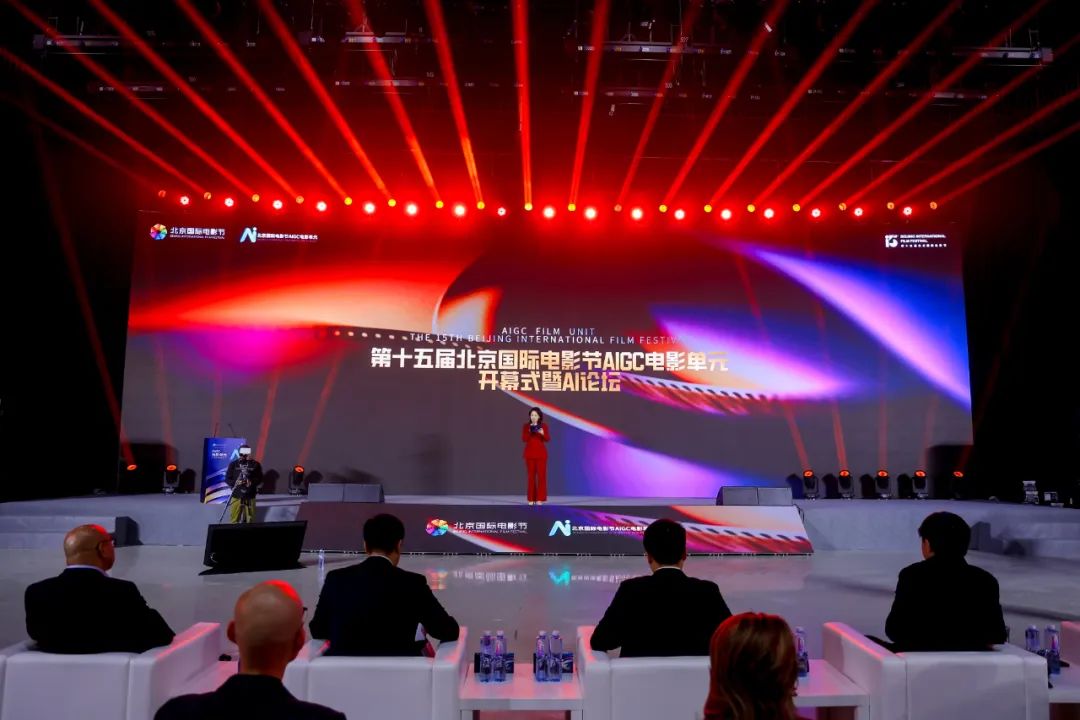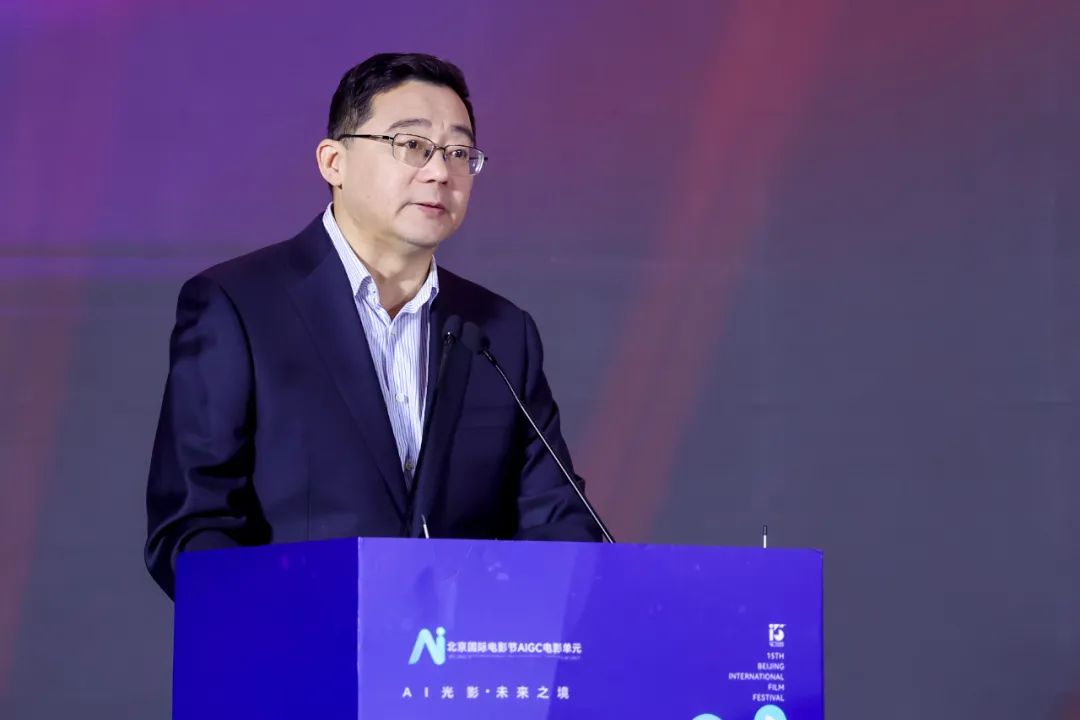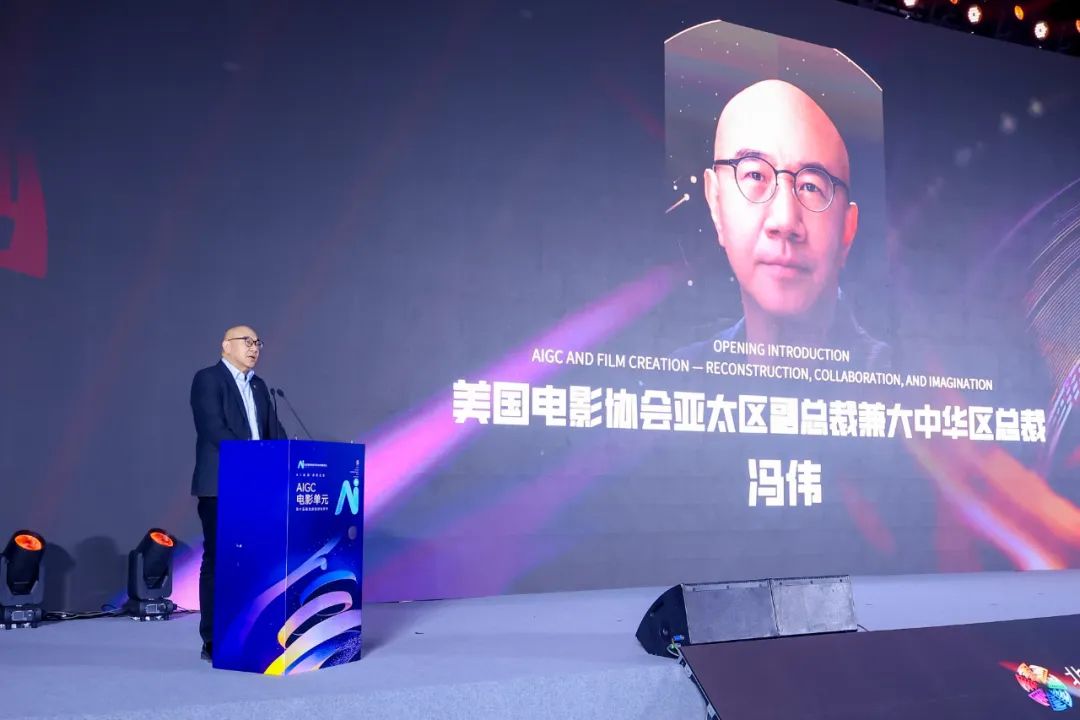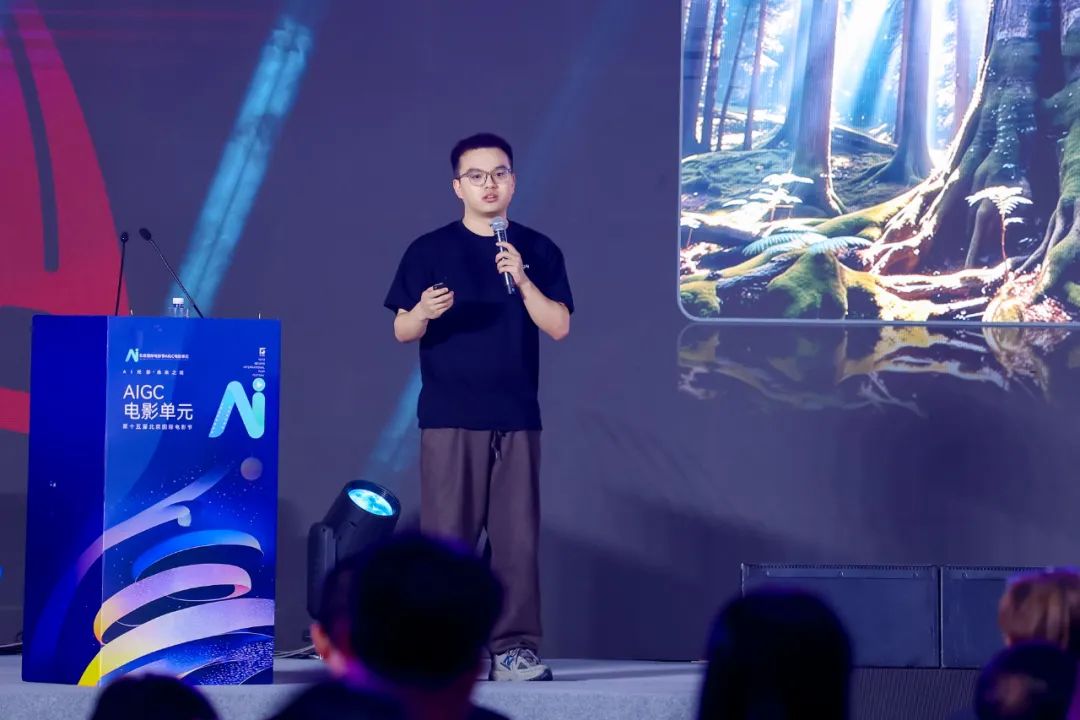The 15th BJIFF AIGC Unit Series of Events Grandly Launched
Recently, the 15th BJIFF AIGC Unit series of events, organized by the Beijing International Film Festival Organizing Committee, co-organized by the Communication University of China, and executed by the School of Animation and Digital Arts and the exclusive technical partner Kuaishou Technology · KLING AI, took place successfully at the Academic Center of the Communication University of China. The BJIFF AIGC Unit is rapidly advancing towards becoming an internationally recognized platform. The series of activities for this year's AIGC Unit are diverse, including the following major events:

I. Launching Ceremony of the AIGC Film Shorts Section
The AIGC Unit of this year's BJIFF positions itself as “global” and “inclusive”, with its appeal and influence significantly increasing. A total of 1,502 submissions from 33 countries around the world were received, a substantial rise from the 433 submissions in the first edition. These works showcase the immense potential and diverse value of AIGC technology in enhancing narrative efficiency, expanding the boundaries of artistic expression, promoting cross-cultural exchanges, and realizing innovative representations.

The Launching Ceremony of the 15th BJIFF AIGC Film Shorts Section
Yang Yi, a Standing Member of CPC Committee and Vice President of Communication University of China, emphasized in his speech: “AIGC technology is reshaping the film industry's ecosystem with unprecedented power. We must embrace change with an open mindset, explore the unknown with a spirit of collaboration, and guide innovation with a responsible attitude.” As a co-organizer, Communication University of China will continue to deeply participate in and fully support the development of the AIGC Unit, contributing “CUC wisdom” and “CUC strength” to the growth of AIGC cinema. Communication University of China will work with the Beijing International Film Festival to make the AIGC Unit an important hub for inspiring creativity, nurturing talent, and promoting international cultural and technological exchanges.

Speech by Yang Yi, a Standing Member of CPC Committee and Vice President of Communication University of China
Bian Jian, a member of the Beijing Radio & Television Station CPC Leadership Group and Vice-Editor-in-Chief, attended the ceremony and delivered a speech. He mentioned that the “creation of an AI hub in Beijing” proposed at the opening ceremony of the first AIGC Unit has now become a visualized interpretation of the “community with a shared future for mankind” by 1,500 creative teams. Additionally, the launch of the Sinopec Theme Competition “Future Energy, Beautiful World” resonates with global sustainable development issues, highlighting the power of technology for good. This also marks the transition of AIGC from artistic experimentation to industrial application. In the future, we will collaborate with more enterprises to explore the application of AI in sectors like energy and cultural tourism, making Beijing not only a source of technological innovation but also a defining force for cultural narratives.

Bian Jian, a Member of the Beijing Radio & Television Station CPC Leadership Group and Vice-Editor-in-Chief, Attended the Ceremony and Delivered a Speech
AI technology has emerged as a significant force, exploding in development over the past two years and becoming one of the most remarkable productivity tools. China has led in AI technology research and development, producing a number of outstanding teams and quality tools driving industry progress. Kuaishou Technology and their developed KLING AI are among the leaders. As the exclusive technical partner for this year's AIGC Unit, Kuaishou Technology · KLING AI provided strong technical support. Zhang Jun, Vice President of Kuaishou Technology, attended the opening ceremony and noted: “AI technology reduces production costs, providing creators with equal opportunities to compete. It allows them to focus on core creativity while experimenting with complex visual expressions at low costs. AI does not replace human creativity; rather, it liberates repetitive tasks, enabling creators to unleash more imagination and ultimately achieve a perfect fusion of technology and art.” In the future, Kuaishou Technology · KLING AI will continue to partner with the Beijing International Film Festival, allowing everyone with a story to take flight toward broader creative realms with the help of technology.

Zhang Jun, Vice President of Kuaishou Technology, Attended the Opening Ceremony and Delivered a Speech
Chen Jingwei, Associate Dean of the School of Animation and Digital Arts at Communication University of China, Zhao Chunyan from the AIGC Audiovisual Industry Innovation Center, Song Dongheng from StoryStorm, Sun Bing from Hi Video, Xie Limei from the Today AI Art Center, as well as renowned directors, producers, university lecturers, and AI technology experts from the film and television industry, gathered to jointly inaugurate the “AIGC Unit” of the 15th Beijing International Film Festival!

Inauguration Ceremony of the “AIGC Unit”at the 15th Beijing International Film Festival, with Partners
II. “AIGC and Film Creation: Reconstruction, Collaboration and Imagination” Theme Forum
The “AIGC and Film Creation: Reconstruction, Collaboration, and Imagination” theme forum was hosted by Feng Wei, Vice President of the Asia Pacific, The Motion Picture Association of America and President of the Greater China Region. The guests discussed the new possibilities of AIGC in film creation from multiple perspectives, including the development of the AI industry, AI in film and television, and the empowerment of AI technology.

Feng Wei, Vice President of the Asia Pacific, The Motion Picture Association of America and President of the Greater China Region
Ma Ping, Head of the China Film AI Research Institute, Vice President of the Chinese Society of Cinematographers (CNSC), film director, producer, and visual director, reviewed the development of AIGC. He pointed out that the film industry is facing a transformation, while the animation industry is relatively mature, and there have been many attempts in the film sector. He predicted the development direction of AIGC micro-drama and industry evolution this year and introduced achievements in the field of sound, emphasizing that creators should correctly understand AI, balance relevant issues, and embrace collaboration.

Ma Ping, Head of the China Film AI Research Institute, Vice President of the Chinese Society of Cinematographers (CNSC), Film Director, Producer, and Visual Director
Chen Kun, founder of Xingxian Culture and AI film director, explored the boundaries of traditional film and AI film capabilities in the forum. He believes that the main advantage of AI films currently lies in cost reduction and efficiency enhancement. In the future, if the generation speed improves or new content forms and commercial opportunities emerge, creators should emulate traditional film effects, as AI films will likely surpass traditional films. Creators should imitate traditional film and television effects, and believe that AI film and television will surpass traditional film and television in the future.

Chen Kun, Founder of Xingxian Culture and AI Film Director
Luo Xiao, a digital artist, creative technology expert, and founder of Experimental Programming, reviewed the history of AI imaging development using open-source technology. He introduced the characteristics of models and tools at different stages, workflow improvements, and the development of domestic AI video generation modules in 2024. He believes that some open-source models have capabilities comparable to commercial models in video production, allowing creators to produce high-quality films.

Luo Xiao, a Digital Artist, Creative Technology Expert, and Founder of Experimental Programming
Chen Liufang, an AI artist and multimodal technology application expert, pointed out: “The development of AI films is rapid, with the capabilities of models continually improving. However, the current creative process still tends to follow an engineering mindset. In the future, AI creation will focus more on operation, with more controllable methods emerging within a year. The creative process will shift toward camera group generation. However, we still face technical challenges such as lip-sync issues in complex scenes and voice generation for silent characters. Additionally, maintaining audience interest in feature-length films remains a challenge. Therefore, creators should focus on creativity and aesthetics, using AI to tell compelling stories and support each other in exploring the value of their works.”

Chen Liufang, an AI Artist and Multimodal Technology Application Expert
At the event, the exclusive technical partner for this AIGC Unit, Kuaishou · KLING, was represented by Li Peihan, Senior Large Models Product Manager of Kuaishou. In his keynote speech, he introduced KLING AI. KLING AI is a globally leading AI visual and expression platform with the vision of enabling everyone to tell stories well with AI. Since its development in June 2024, KLING AI has undergone several iterations, amassing 22 million users worldwide. It has generated 168 million videos and 344 million images, ranking at the top in download charts across various national app markets. On April 15, the 2.0 version of KLING AI was released, surpassing some competing products in image and video generation models, while also introducing a new interaction concept. KLING AI is dedicated to becoming the infrastructure that sparks creativity and drives AIGC into the “era where everyone can be a director”.

Li Peihan, Senior Large Models Product Manager of Kuaishou
In the subsequent roundtable forum, Feng Wei, Vice President of the Asia Pacific, The Motion Picture Association of America and President of the Greater China Region; Xue Xiaolu, a famous film director, screenwriter and executive producer, Vice Chairman of Beijing Film Association; Li Peihan, Senior Large Models Product Manager of Kuaishou; and Shi Gang, Professor of Film and Television Animation at the Xi'an Academy of Fine Arts and Vice Chairman of the Digital Art and Animation Professional Committee of the Chinese Collegial Association for Visual Art (CCAVA), had a profound discussion on “Where is the future of theater movies in the era of AI+short videos?” The guests noted the obvious advantages of AI in film creation, such as the ability to quickly generate scripts, construct virtual scenes, improve creative efficiency, and assist small teams in production, thereby lowering the creative threshold. However, they also acknowledged AI's limitations, including its inability to precisely capture emotional resonance from the audience. Currently, much of AI creation is based on simulating existing content, lacking innovation. Regarding the viewing experience, the impact of short videos on cinematic films requires the use of virtual shooting, 4D effects, and other technologies to enhance immersion. In terms of talent cultivation, universities should emphasize training interdisciplinary talents that combine technology and art. For independent filmmakers, while the AI era intensifies competition, it also brings new opportunities. They must find unique narrative approaches and leverage AI's advantages to achieve creative breakthroughs.

Roundtable Forum
III. AIGC Unit Project Pitches Meeting and Film Screening
On April 24, the AIGC Unit Project Pitches Meeting was held at the main venue of BJIFF Langyuan Station. Hosted by StoryStorm, the event was attended by Li Tingwei, Party Secretary and General Manager of Poly Film; Zhang Baoquan, Chairman of Antaeus Group; Quji Xiaojiang (Jia Yanjiang), Head of the AI Studio at Bona Film Group; Bai Bing, COO of Sunac Culture; Hu Kun, Head of the KLING AI NEXTGEN Project Pitches Program; and Wang Qiang, Founder of Vogue Imaging Workshop, who served as judges for the Project Pitches Meeting. They facilitated the incubation and connection of outstanding AIGC film projects, creating a project pitches platform for creators and platform enterprises, thus promoting industry collaboration.

AIGC Unit Project Pitches Meeting
This year's shortlisted works for the AIGC Unit were exhibited at the School of Animation and Digital Arts at Communication University of China and the TopNew Film Industrial Park. The shortlisted short films were gathered into an exhibition program and screened during the AIGC Unit event. In just 72 hours, audiences were immersed in a visual feast that redefined their cinematic experience with mind-bending screen spectacles.
Where there is film, there is dream. The brilliance never ends. The 6th Beijing Youth Film Festival is on the horizon - stay tuned for more cinematic brilliance!

